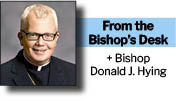
This month, on November 2, All Souls’ Day, the bishops of Wisconsin issued the fourth edition of Now and at the Hour of our Death, a pastoral letter concerning Catholic teaching on death and dying, end-of-life issues, and the importance of funeral planning.
This important document, published with the generous financial assistance of the Knight of Columbus in our state, is an invaluable resource for all of our Catholic people to be formed properly on these important matters that reach the very heart of our faith and impact all of us profoundly.
‘Dignity’ and death
The growing acceptance of euthanasia is a grave concern for the Church.
Many countries and some states have legalized assisted suicide, moving beyond those with a chronic illness to even facilitate the deaths of people with depression or those who simply do not want to live any longer.
“Death with dignity” has become the rallying cry for this ideology which has taken firm hold in Europe and Canada.
As in all things, the Catholic Church embraces the natural approach to death and dying, lifting up the fundamental evil of hastening death through human effort, but also not insisting on the sustenance of life through artificial means.
Life is sacred, social, and eternal, a gift from God that we receive in gratitude.
We do not have the right to hasten the dying process out of a misplaced sense of mercy or a failure to understand the spiritual meaning of suffering.
The death and Resurrection of Christ give us hope that life has the final word on death, and therefore we can face our own pain and mortality with a radiant faith in the One who carries us over the waters of death to the glorious Kingdom of God.
“A person has the moral obligation to use ordinary or proportionate means of preserving his or her life, those that in the patient’s judgment offer a reasonable hope of benefit and do not entail an excessive burden on the family or the community.” — this quote from the Ethical and Religious Directives for Catholic Health Care Services from the United States bishops makes clear that euthanasia and assisted suicide are gravely immoral.
Talking your wishes over with family and friends, naming a durable power of attorney, and signing a document with your advance health care directives are important safeguards against any immoral actions or confusion when you are in a grave or mortal condition.
It is important to note that the Church highly values quality palliative care for the suffering and dying, as a way to ease their pain while respecting their human dignity.
The importance of funerals
Now and at the Hour of our Death also articulates the Church’s view on the importance of the funeral for our deceased loved ones.
Sadly, many families do not have a Mass or even a prayer service when a loved one dies.
Often, a celebration of life at a bar or simply nothing at all is the response of the bereaved.
Death is a sacred passage that requires us in radical charity to offer a Mass for the deceased and to pray for them. Such rituals also help the living to grieve well and to heal.
The Catholic Church’s rituals surrounding dying and death are profoundly beautiful and link us to the meaning of Baptism as our saving participation in the death and Resurrection of Christ — the Paschal Mystery.
The Church believes that burial of the body gives fuller expression to the Christian faith, but cremation is also permitted.
Because we are incarnate spirits, believe in the resurrection of the body, and know our bodies as temples of the Holy Spirit, we offer great respect and reverence to the body of a deceased person and bury them with love and prayer.
“Therefore, Catholics are encouraged to avoid cremation if possible, but if it is chosen, it is strongly recommended to have the body present for the Funeral Mass before cremation takes place. In any case, cremated remains must be placed in a worthy vessel and interred or entombed. Remains can never be kept at home, divided among various family members, or spread around.” (Now and at the Hour of our Death ,Page 14)
Alkaline hydrolysis or human composting is a grave offense against the dignity of the human person and the body.
Green burials are permitted, whereby the shrouded body is simply lowered directly into the earth without expensive caskets and vaults.
I highly encourage all Catholics to make their wishes known both verbally and in documents concerning health care decisions and funeral planning.
In this way, those who love you will know and implement your Catholic convictions and desires regarding your passage from this world to the Father.
I commend and thank our priests, deacons, pastoral ministers, health care professionals, funeral directors, and liturgists who work hard and compassionately to assist the dying faithful and to minister to the grieving.
This important work is both a Corporal and Spiritual Work of Mercy and is integral to the mission of the Church in the salvation of souls.
Please read Now and at the Hour of our Death, and if you have not already done so, make the plans that your family and friends will so profoundly appreciate when our time to pass from this world to the Father arrives.

